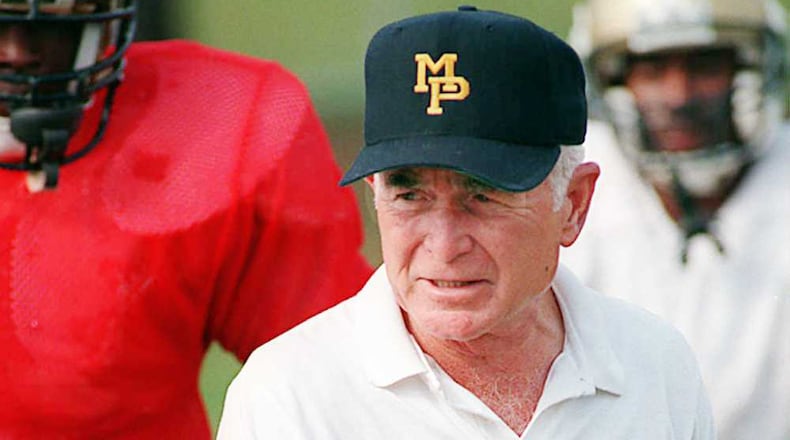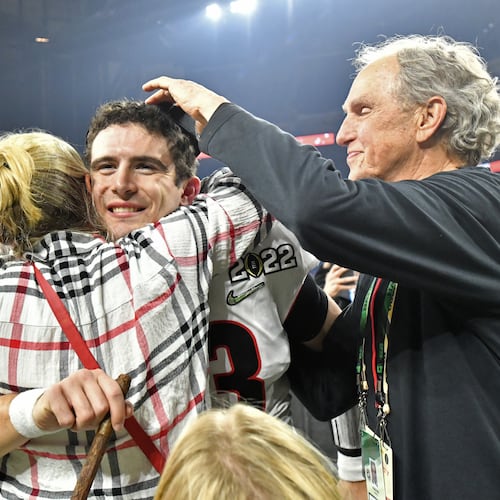FORSYTH – Coach Dan Pitts had it planned to the end. His funeral, he told friends and family weeks ago, should go no more than 15 minutes. Just 15 minutes to mark a long life spent nurturing one of those high school football programs that serve as the nucleus of southern small-town life. That was plenty, he figured. He insisted, really.
For once, the team didn’t run his play. Pitts’ funeral went into overtime Friday, by only another 15 minutes or so. At that it was still absurdly modest in proportion to the reach of one coach’s career. A little scripture. A quick tribute to a man who poured the idea of unbending discipline into generations of teenagers who don’t come by that naturally. A lovely version of “How Great Thou Art.” The Lord’s Prayer, punctuated by a call of “Bulldogs!” – just like they used to do it on the sidelines before a Mary Persons High School game.
Pitts’ life in this place began in 1959 when an untried former quarterback at Lincolnton High School, by way of South Georgia College and the University of Georgia, applied for the head coaching job at Mary Persons. You could do that back then, and it might work. He asked for the gig, and he actually got it.
Turned out, his first job was also his last job. Such instant and permanent bonding just doesn’t happen anymore, and that’s what makes Pitts’ standing so special in this town of 4,100 about 60 miles south of Atlanta. He wasn’t tied here by birth but by choice. And when he retired 39 years later, Pitts was the winningest high school coach in Georgia (his 346-109-4 record has since been eclipsed).
“It was an absolute perfect marriage all around,” said Bill Bazemore, a center in the late 1970s, later one of the town bankers.
This is how it still goes around here when there’s no pandemic in the way: “When the lights on Dan Pitts Stadium come on Friday night, the lights in the town go out,” said the current Mary Persons coach, Brian Nelson. The school and the community seem to work on a single circuit. When Pitts’ teams won – and they won a lot, one state title in 1980, four trips to a state championship game, 15 region championships – a small town got a little bigger.
Pitts died earlier this week at the age of 88 after a battle with lung cancer. All that separates the city cemetery from the Mary Persons football practice field is a thin curtain of trees and scrub. His grave, next to that of his wife, Mary, faces the field where the sounds of practice will keep him company for all the falls to come. They say Pitts tolerated the games but loved the practices. It was just the make-up of the man who would just as soon hit golf balls on the practice range than actually play a round.
One last open-ended huddle numbering more than 300 formed up around the gravesite Friday. Old teammates and townspeople reunited. The owner of the local Dairy Queen played for Pitts. The drug-store owner was his quarterback. His banker and his lawyer played for him. Others who had moved off to the big city of Atlanta returned to say goodbye and to credit him for some part of what they had become.
“It was the leadership skills, I don’t know where I’d be without those that he passed along,” said Eric Porter, a former linebacker from the Class of 1988, a one-time principal at Mary Persons before moving to Conyers and private business.
“He didn’t know how to quit, and, so, that’s not a word in your vocabulary,” said David Sewell, Pitts’ quarterback in the late 1970s. Retired from the postal service, he lives in Mableton. “He made you tough as nails. You took life on like that with ease, having gone through that with him.”
He was the square-cut coach who got a haircut every Thursday of game week. He polished his shoes each week before the game and inspected his players’ footwear to make sure they were tidy, too.
One former assistant remembered being invited to his home for dinner, arriving late, and eating with the coach’s wife and kids. Pitts had eaten at the assigned time and was in the other room watching television.
His players kept their helmets on at all times. If a player was spotted walking when they broke the huddle or between drills, he could be assured he’d be running stadium steps later.
At the end of his practices, his offense had to run 10 plays perfectly before anyone could go home. Sometimes they could do that in 15 minutes. Sometimes it would take more than an hour. There’s a reason Pitts’ teams gained the reputation of overcoming whatever disadvantages they might have in size or speed through sharp-edged execution.
Pitts also was remembered as an important bridge in the early 1970s when Mary Persons was integrated. He had brought in Black players the previous spring to get a jump on the introductions, to ease the tensions. When a former assistant once asked Pitts what the racial makeup of his team was, Pitts told him he had no idea. That wasn’t something he’d count.
“He won over the players, won over the community. It really helped everything, not just football,” said Bobby Melton, a Forsyth attorney whose hobby is tracing the history of Mary Persons football.
Sewell would be the first Black quarterback to start for Persons, and the two of them never discussed the significance of that. “Everybody’s watching me. He had done all this winning and he took a chance on this skinny Black kid,” said Sewell, who went unbeaten during the 1979 regular season. “He never talked about race. He never brought it up.”
The legacy of a coach never is adequately explained by numbers. And in the brief service for Dan Pitts on Friday, they took up very little valuable time reciting wins and losses.
As Bazemore, the long-ago center, better put it before the service: “He taught us that hard work equals success, plain and simple. It’s not about necessarily talent, it’s about working hard. He taught all of us that. And when we worked hard, we were successful. And that translated over into being a father, being a husband, being a professional.”
About the Author
The Latest
Featured


